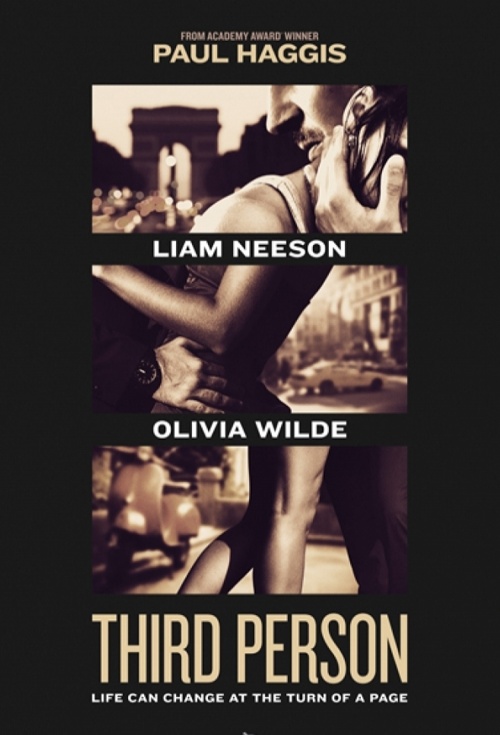Genre: Drama
Premise: Follows a group of characters, with the focus on a writer trying to finish his latest novel in the midst of a complicated affair.
About: This is Paul Haggis’s latest writing-directing effort. Haggis’s film, Crash, won the Best Picture Oscar in 2004. Haggis has gone back and forth between big projects and personal projects since. His personal projects haven’t really broken out, but his big projects have done just fine (Million Dollar Baby, Casino Royale, Quantum of Solace). Haggis was known even before Crash as one of the better writers in town, so his scripts are almost always good reads. Third Person comes out this month (June 20th) and has a stellar cast that includes James Franco, Mila Kunis, Olivia Wilde, Liam Neeson, Maria Bello and Adrien Brody. It should be noted that this is an older draft and that Haggis has probably worked on it since.
Writer: Paul Haggis
Details: 121 pages – May 24, 2011 draft
Man, just a week after I told everyone to beware of The Wall of Text, I see it on the FIRST PAGE of Third Person! BUT before all of you go hollering at me (“See Carson! There are no rules!”) we should note that Haggis is also the director of this script, and therefore the rules don’t apply. Without having to get his script past readers, he doesn’t need to keep their attention the same way you, the unknown do.
It was rather strange to see though, as the last couple of Haggis scripts I read were quite sparse. Maybe this was an early draft where Haggis was still exploring things and therefore unafraid to ramble? I don’t know. But after you get past the opening Text Wall, things start moving along a lot faster, and Third Person becomes one of the better scripts I’ve read this year.
I have a new gauge for determining screenplay quality: How many times I check the internet while reading! With Third Person, I only checked TWICE! For the average Amateur script, I probably check it at least 30 times. Maybe I’ll add the “internet check gauge” at the end of every review now. We’ll see.
Third Person follows a group of seemingly random characters. There’s 50-something Michael, a married writer who’s rented out a hotel room in London to finish his latest novel. There’s 20-something Anna, an aspiring writer who’s having an affair with Michael. She’s flown to London so Michael can read her latest short story (which she hopes to get published), with ‘fooling around’ also on the docket.
There’s 40-something Sean, a middle-income married businessman in Italy. He meets a beautiful but troubled local, Monica, who’s in desperate need of money to buy her daughter back from some bad men.
Finally, there’s Julia, an extremely attractive woman who’s had a huge fall from grace. Once married with a son, she went crazy and almost tried to kill him. She risks never seeing her son again if she can’t convince a court-appointed therapist that she’s sane.
The main story is Michael and Anna. Despite it being the most boring plot on paper, the relationship between the two is captivating. Both of these characters have trouble loving, and they push and pull at each other in such a depraved manner that you’re constantly wondering what the hell’s going to happen to them. Both characters have power over the other (him, his job, her, her sexuality) and use that power at every turn.
The Sean storyline is a weird one. Sean meets this Monica girl at a bar in Italy. She “accidentally” leaves her bag there. He finds her to return it, which is when he learns she’s trying to save her daughter and needs money to do it. Sean’s not sure if he’s being conned, but he gets the money for her anyway because he wants to believe in her, because he wants to believe in a just world. What happens next are a thousand twists and turns as we, like Sean, wonder if this woman is legit or not.
Julia’s story is the least interesting, as we’re not given enough information up front to understand why this therapist meeting is so important to her. Therefore, everything leading up to that appointment is fairly boring, as her scenes are relegated to cleaning hotel rooms at the hotel she just started working at.
I’d give Third Person an “impressive” through the first 100 pages. Michael and Anna’s relationship in particular was a blast to read. Not only was there the unpredictability of the relationship itself, but both characters were putting important writing works into the world, and the suspense of how those works were going to be received (Michael, by his publisher, and Anna, by Michael) kept me engaged. True, my love of writing played a part in that, but even without it, this was one of the better relationships I’ve read on the page in awhile. The only way I can describe it is pure… ENERGY.
Indeed, the unpredictability of those two bled into the rest of the script. Haggis is so far ahead of you as you try to predict where this will go, that after awhile you shake your head and give in. It’s what every great writer does. With whatever element you’re writing (story, character, scene), figure out what the audience’s expectation is, then use that against them. Haggis does that again and again and again here.
Where Third Person gets weird is in its final act. I don’t know if Haggis was trying to outthink himself or what, but let’s just say it begins with a HUGE F*CKING SHOCK. Something we didn’t see coming at all. I actually had to go back and re-read earlier parts of the script just to confirm that what I read was what I read (I’m sorry I can’t reveal it here – it’s too huge of a spoiler).
Personally, I don’t think Haggis set up that twist well enough for us to buy it. But it’s what happens afterwards that throws us for a loop. As the plotlines start to intersect, either they don’t intersect clearly or I completely missed some earlier setup, because all of a sudden Julia (the child-hurter) is calling Michael’s wife and I had no idea these two even knew each other. It was so out-of-left-field, I started to wonder if Julia and Anna were the same person.
Part of my reasoning was that Michael’s novel was supposedly about characters who didn’t know they were in a book (a throwaway line early on). But that didn’t explain how characters could’ve been the same people.
The thing is, the first 100 pages are so good, you almost forgive this confusion and believe it’s your fault (maybe it was?). And in the end, when I put Third Person down, I immediately wanted to discuss it with someone to figure this stuff out. That’s a good sign. Because I’ve read plenty of confusing scripts where the only thing I wanted to do afterwards was press delete.
The bigger picture here is that Third Person is a dying genre. This is a straight drama where nobody shoots anybody. Kramer vs. Kramer kind of stuff. They don’t make these movies anymore. Hollywood has a new name for them. They call them “execution dependent,” and saying those words in a studio office is the equivalent of telling the executive that you banged his wife last night. In fact, he’d probably be happier if you banged his wife.
Indeed, if these dramas are executed well, they’re awesome. But if they’re not, they can lose 50 million easy. And for what? Maybe 40 million upside? No studio wants to take that chance. They’d rather make a monster/alien movie that, whether it’s executed well or not, they can slap together a snazzy trailer for and get people to show up.
There are a few people left making these movies and Paul Haggis is one of them. Thank God for that because we need variety in the marketplace.
[ ] what the hell did I just read?
[ ] wasn’t for me
[xx] worth the read
[ ] impressive
[ ] genius
Number of times I checked Internet during read: 2 times
What I learned: If you’re writing a straight drama (no cops or spies), you have to make the audience talk afterwards. That’s the only way you have a shot. You don’t have explosions or special effects to bring people in the traditional way. So you need word of mouth. Haggis does that two ways here. First, there’s that huge shocking twist on page 100 that I can’t spoil (sorry!). And second, the last 20 pages are open to interpretation, which should get people trading ideas afterwards. In other words, when you’re writing these, think about movies like “The Crying Game.”



